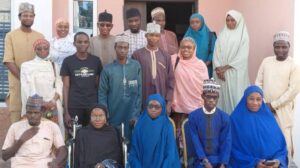The Centre for Information Technology and Development (CITAD) has concluded a two-day capacity-building workshop for journalists with special needs in Kano, focusing on Digital Journalism, digital rights, data privacy and the use of Canva and artificial intelligence in journalism.
The training, held under CITAD’s Persons With Disabilities (PWDs) Digital Hub, began on Saturday and ended on Sunday as part of the organisation’s efforts to promote digital inclusion and ensure no one is left behind in the media and technology space.
Declaring the workshop open, CITAD Executive Director Malam Y.Z. Ya’u, represented by the organisation’s Communications Officer, Ali Sabo, said the initiative was designed to equip journalists with special needs with skills to improve their professional work.
“We want to ensure that every journalist — regardless of disability — has equal access to the tools and knowledge shaping modern journalism,” he said. “This training is part of our commitment to digital inclusion. As we always say, knowledge is only useful when everyone can access it.”
Sabo, who also handled the session on digital rights, privacy and data protection, urged participants to prioritise the safety of their personal and professional data.
“Journalists operate in sensitive environments. Understanding digital safety is not optional; it is essential,” he said.
Also speaking, Dr Bala Muhammad of the Department of Mass Communication at Bayero University Kano urged participants to take the training seriously and apply the skills in their respective media organisations.
“Training is only meaningful when it reflects in your practice,” he said. “Pay attention, make use of what you learn here, and become ambassadors of digital professionalism in your newsrooms.”
Other resource persons included Hamza Fagge, who spoke on digital inclusion, and Mubarak Shehu Dayyab, who trained participants on the use of Canva for journalism, AI for news production and social media content creation.
Fagge stressed the importance of inclusive digital spaces, saying, “Technology should be a bridge, not a barrier. Everyone deserves access to the tools that shape our world.”
Dayyab encouraged participants to adopt new tools for storytelling, saying, “Today’s journalist must blend creativity with technology to stay relevant.”
Participants said the workshop broadened their understanding of digital safety and enhanced their capacity to produce multimedia content.
Ummasalma Idris Ibrahim of Freedom Radio said the workshop opened her eyes to new possibilities in digital journalism. “The training has shown us that disability is not a limitation,” she said. “With the right tools, we can compete and excel like anyone else.”
For Bashir Ali Haruna of Vision FM, the sessions offered a new sense of confidence. “What CITAD has done is more than training — it is empowerment,” he said. “I now understand how to protect myself online and how to produce richer content for my audience.”
The event forms part of CITAD’s broader mission to support digital literacy and empower marginalised groups across Nigeria.
